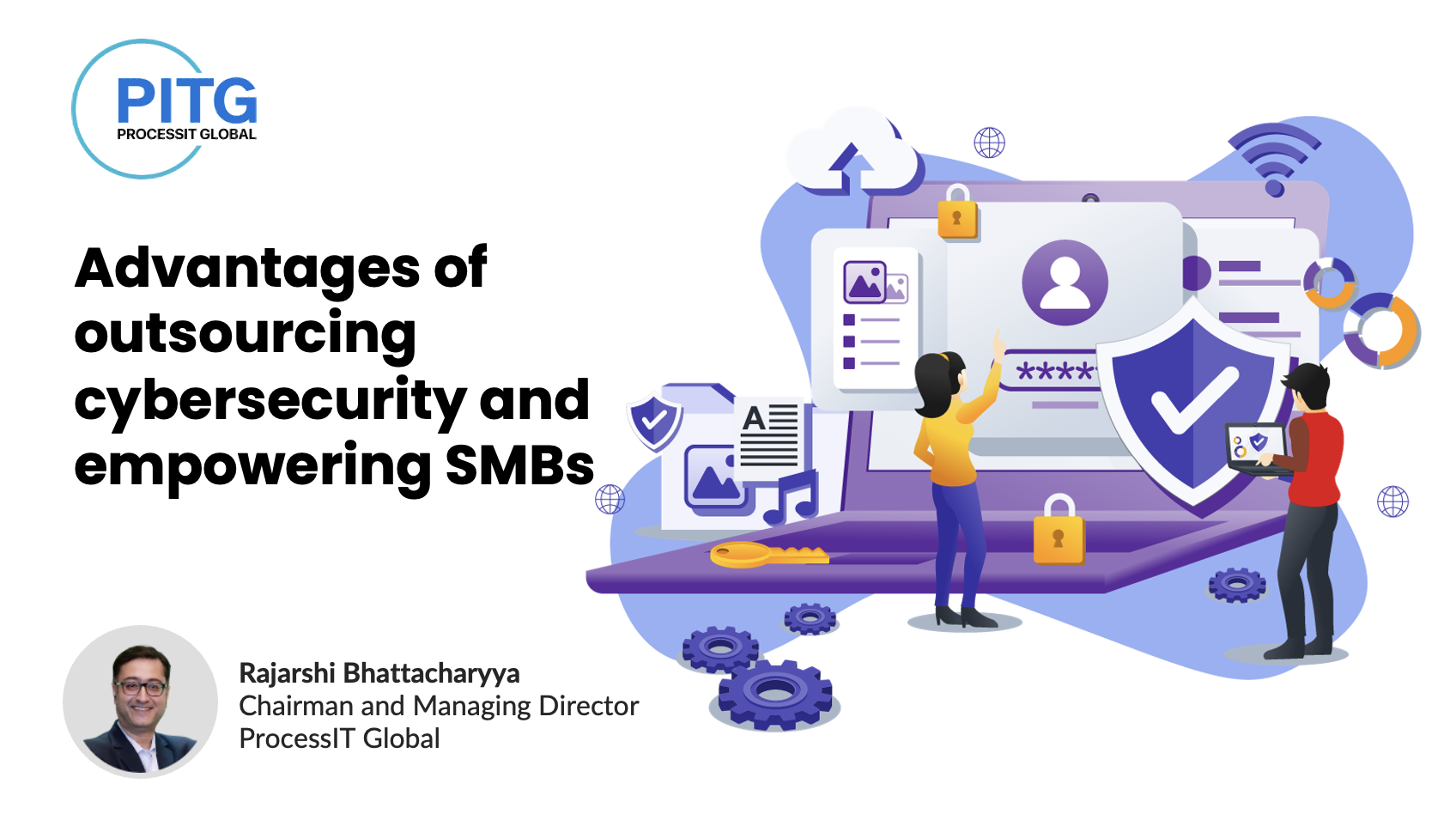Advantages of outsourcing cybersecurity and empowering SMBs - Rajarshi Bhattacharyya, Co-Founder, Chairman and Managing Director, ProcessIT Global

In today’s digital age,
where most business transactions and customer interactions occur online, in the
interconnected world, no organization is safe from cybercrime. This additional responsibility of
safeguarding business operations and customer data from cyberattacks and
threats while maintaining a robust IT infrastructure can be an overwhelming
task for organizations.
Irrespective of the
size or nature of the business, implementing a robust cybersecurity strategy
and continuously enhancing the organization’s posture is the need of the hour.
Small and Medium Businesses (SMBs) may not have as abundant resources as large enterprises but they are exposed to the same kind of threats. Furthermore, SMBs are more vulnerable to cyber threats as they often lack comprehensive security measures to protect themselves from cybercrime and associated risks. Being increasingly dependent on technology that helps drive growth and efficiency, SMBs are finding themselves trapped in the complex digital landscape. They completely understand the need to have robust cybersecurity measures in place to safeguard sensitive data as well as for business continuity. However, having an in-house cybersecurity team is often considered a luxury for SMBs.
SMBs
continue to face escalating cybersecurity challenges
It is
easy to think smaller organizations are less likely to get attacked because of
their size. However, this is not true
because it is not the size of the company but the nature of the data that makes
it attractive to cybercriminals. Credit
card data, confidential customer data, or something related to intellectual
property appeals to attackers, and the size of the organization becomes
irrelevant. SMBs are more often not well
prepared for a cyber attack due to limited resources, budget constraints, and
lack of in-house expertise, making them easy targets. Furthermore, it is tough for smaller
organizations to recover from the financial ramifications of threats which
include phishing attacks, ransomware, and data breaches that are increasingly
getting more sophisticated. Such
incidents have a big impact on their bottom line and brand reputation and may
even lead to the winding up of the business.
Navigating the complex landscape of industry-specific regulations and
data protection laws is not easy and non-compliance can lead to legal
consequences too.
These numerous challenges faced are recognized by SMBs and a majority of these organizations are opting to outsource cybersecurity or partner with a Managed Security Services Provider (MSSP) that has emerged as a viable solution to strengthen their digital defenses.
Benefits
of outsourcing cybersecurity for SMBs
Access
to expertise and security best practices
MSSPs specialize in staying abreast of the latest threats and trends. By partnering with an MSSP, the organization’s security needs are addressed with expert inputs from highly skilled professionals. MSSPs also have access to advanced tools and technologies as well as cyber security strategies to address the evolving cyber threats.
Cost-effectiveness
MSSPs provide cybersecurity services to several organizations at a much lower price as compared to in-house security teams. On the other hand, establishing and maintaining an in-house security team can be expensive for organizations operating within constrained budgets. Moreover, without incurring overhead costs associated with not only hiring but also training an internal security team, organizations are able to access top-level security services.
24X7
Support (Coverage, Monitoring and Response)
It is a well-known fact that cyber criminals work beyond the operating hours of the organization they are targeting. Therefore, it becomes imperative for organizations to have cybersecurity defenses active 24X7. This is possible by partnering with an MSSP that provides continuous monitoring and round-the-clock cybersecurity operations (SOC) without compromising on quality. This may limit the impact of security issues that may occur as suspicious activities can be detected quickly with timely response to threats.
Redirect
focus on core competencies
Partnering with an MSSP enables the teams in the organization to focus their time and energies on important aspects of the business or their core competencies. This can include fine-tuning product development improving business operations and expanding into new markets. The teams are not distracted or burdened with managing cybersecurity operations but will be able to put all effort into achieving larger business goals, enhancing customer experiences, driving innovation, and expanding operations that lead to better business outcomes.
Quick
deployment of new technologies and tools
An efficient and effective MSSP will have the right resources and expertise to successfully manage any new project assigned to them. This can eliminate the need for organizations to invest time and money in hiring the right talent, latest technology, and tools in addition to providing ongoing training. MSSPs always offer workable recommendations and implement the best solutions that are based on their rich industry experience.
Scalability
The majority of SMBs are likely to experience ups and downs in their businesses and cybersecurity is required according to their current needs. Yes, there are instances where a project gets paused for a few months, but the organization has to still pay for their in-house security teams. MSSPs provide the flexibility for businesses to quickly scale up or down based on the business requirements. Organizations can take advantage of well-trained and expert professionals from the MSSPs to manage the shifting volumes of security services.
Ensures
continuous compliance
Several
industry verticals are under stringent regulatory frameworks and data
protection laws which require strict adherence to compliance standards. MSSPs specialize in regulatory landscapes and
offer customized solutions to businesses that align with industry
standards. They will manage compliance
and the entire documentation on the organization’s behalf by conducting regular
assessments and audits.
By
partnering with MSSPs, organizations are in a better position to navigate the
complex regulatory landscape.



